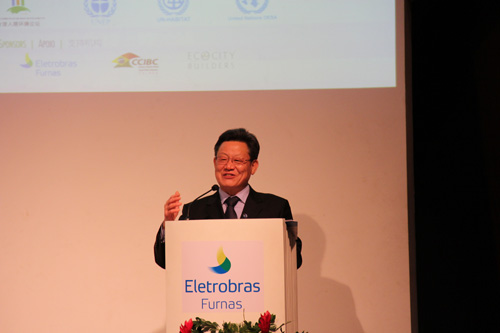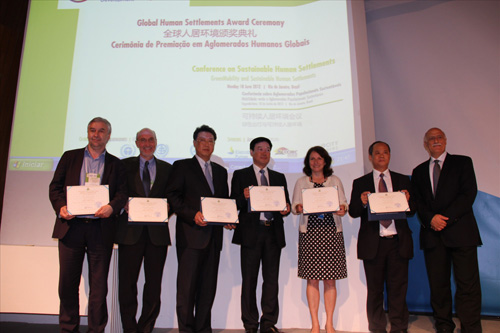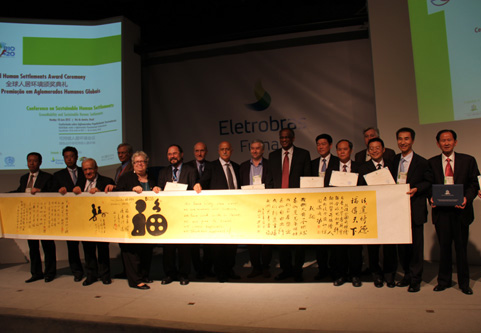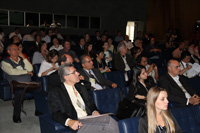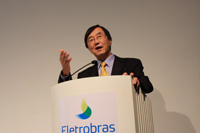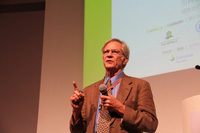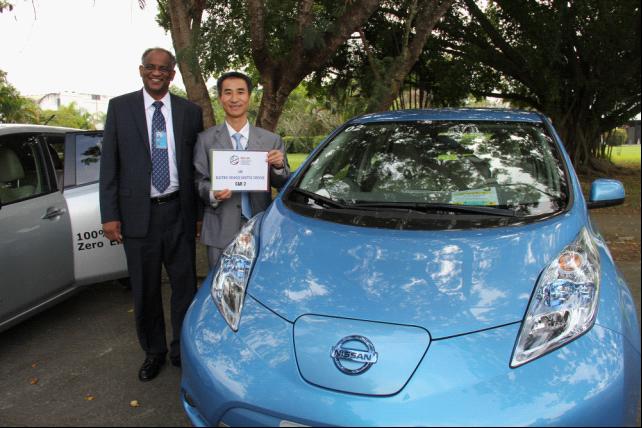Committed to Sustainable Cities and Human Settlements for All
In Special Consultative Status with ECOSOC
Rio +20 Associated Events:
Core tips: Strengthening urban transport and building sustainable human settlements are the key and premise of a sustainable future. On June 18 Rio time, as one of the most important associated events during Rio+20, Global Forum on Electric Mobility & Conference on Sustainable Human Settlements was inaugurated in the auditorium of Eletrobras Furnas, which is the biggest clean energy supplier in Brazil. “Greening transport for sustainable development, green mobility and sustainable human settlements” are the themes of the forum and conference. Policy makers, representatives from private sectors and all walks of life converged in this meeting. In-depth discussions about the latest trend of green mobility, electric vehicles and battery technology, policies related to urban transport and green mobility, etc. were made in this conference. The latest achievements and best practices were shared with the delegates from various countries and the general public, to promote the rapid and healthy development of green mobility. In particular, the Conference on Sustainable Human Settlements explore the challenges and opportunities that green mobility and sustainable human settlements are facing, for supporting the construction of low-carbon city in a better manner and achieving the future we want. A series of foresight consensuses and campaign proposals were made in the conference, which makes positive contribution to enrich and perfect the final achievements of Rio +20. Ambassador Sha Zukang, United Nations Under-Secretary-General for Economic and Social Affairs (UNDESA) and the Rio +20 Secretary-General, addressed the meeting.
The Rio+20 Pure Electric Vehicle Demonstration Project put on lots of highlights at the conference. This activity was organized by GFHS and was authorized by the Brazilian National Rio+20 Organizing Committee and got a lot of supports from the UN. This event consists of two parts: one is to provide transportation services to the United Nations Rio+20 colleagues and the other is to hold an electric vehicle exhibition and a test-drive catering for delegates and the public in Bara Arena during the Rio+20 period. This is the first time for UN to select pure electric vehicles to provide transportation services on a biggest world environment summit. Renault Nissan Alliance, as the only chosen electric vehicle enterprise dedicating to Rio+20. It supplied over 20 different kinds of high quality e-cars and driver services and logistics technologies for this activity. Meanwhile, the Rio+20 Pure Electric Vehicle Demonstration Project organized by GFHS also displayed to the delegates and the public the charm of zero-emission electric vehicles and green mobility as a good option of the future,which is contributive to the positive results of Rio+20.
This forum’s contribution to Rio+20 lied in the novelty and innovation of battery technology and electric vehicle technology to most of the burgeoning economies. During the United Nations Conference on Sustainable Development, the holding of Global Forum on Electric Mobility provided strategic opportunities for the publicity of electric vehicle technology. The forum can improve the public’s awareness on the economic benefits, environmental benefits and social benefits of electric vehicles. In the meantime, the public can also understand and grasp the technological innovation of electric vehicles and the trend of declining cost. A series of foresight consensuses and campaign proposals were reached in the forum, which made positive contributions to enrich and perfect the final results of Rio+20.
As the second half of the event, the Conference on Sustainable Human Settlements was held in the auditorium of Eletrobras Furnas in the evening of June 18. The conference was jointly held by GFHS, UNDESA, UNEP and UN-HABITAT. And it also got the full support from Eletrobras Furnas – the biggest clean energy supplier in Brazil, Chamber of Commerce and Industry of Brazil and China (CCIBC), and EcoCity Builders. The theme of this conference is “Green Mobility and Sustainable Human Settlements”, whose emphasis was on the discussion of the challenges and opportunities faced by green mobility and sustainable human settlements for the purpose of supporting low-carbon city building in a better manner and achieving the future we want. Ambassador Sha Zukang, United Nations Under-Secretary-General for Economic and Social Affairs (UNDESA) and the Rio+20 Secretary- General, addressed the meeting. UN Senior Officials, Leading Policy Makers from National and City Governments, Representatives of Transport Authorities and Private Sectors, Urban Planners, Architects, Experts, attended the conference.
Currently, the population of the world is over 7 billion. More than half of the population live in urban areas, and the urban population is projected to account for 70 percent of the world’s total population by 2050. We are in an unprecedented, rapid, and irreversible urbanization era. The issue of sustainable human settlements is a vital one, involving all challenges that the Rio+20 concerns, such as combating poverty and responding to economic and financial crisis; energy, water, food safety, sustainable economic development, employment, forest, and ocean. Now that city is the economic center and is the source of emission, pollutions and income disparity, we must pay particular attention to them and we have to look for solution from cities. Building and transport are the two big city emission sources and have become the key factors restricting sustainable development. An indisputable fact is that sustainable human settlements plays a critical role in eliminating poverty, developing green economy and realizing sustainable development. This conference is aimed to seek for systematical and efficient solutions for sustainable human settlements, promoting international positive actions and making contributions to Rio+20.
Centering on the two layers of international proposals and regional actions, and contributing to Rio +20
The participants had a discussion on the two group issues: “The International Initiative, Framework and Standards on Sustainable Human Settlements and Green Mobility”, and “The Action and Proposal on Green Mobility and Sustainable Human Settlements in Local Authority and Private Sector”. Arab Hoballah, Chief of Sustainable Consumption and Production UNEP/DTIE, released the UN Environment Agency “Global New Proposal of Conservation-Oriented City”. The new proposal appeals for constructing conservation-oriented and low-carbon emission characterized cities. Andre Dzikus, Senior Programme Officer, Water and Sanitation, Leader of Urban Mobility Unit, UN-HABITAT delivered a speech titled “New Urban planning and design and compact cities in relation to electric mobility”. He emphasized the importance of sustainable city planning and design, and its lead function in the aspect of green mobility such as integrating space and transportation planning, strengthen fundamental facility construction, adopting green public transportation incentive measures, promoting non maneuvering traffic, low-income community privilege and so on. Dr. Awni Behnam, Assistant Secretary General, UN Commissioner General, Shanghai Expo, put forward his sincere advice and showed his opinion on the coastal cities which are facing the threat of rising sea level with a population of 2.8 billion. He proposed taking “Blue Economy” as an integrated approach to manage the sea and cities, which means that all the stakeholders are of inclusive relationship and their long term targets and short term demands should be internally consistent. Lu Haifeng, Secretary General of Global Forum on Human Settlements, released the standard index proposed by IGMC –which combines industry, business, leisure and inhabitancy in one body –and its latest development. As a future sustainable new pattern urbanization model, International Green Model City (IGMC) proposes that low-carbon city building should integrate with green economy and culture. Therefore, GFHS and UNEP cooperated and developed the IGMC standards and rating system, which take the Twelve Basic Principles as its core, to guide the cooperation of stakeholders. Green mobility is one of the cardinal principles. Green mobility accounts for more than 60 percent in the target. The emphasis lies in encouraging the public to reduce their reliance on private cars. It is reported that the first world 420 hectares IGMC pilot project has settled in Huaxi District Guiyang City China, which will officially launched within this year. The topic of Richard Register, President of EcoCity Builders, is “EcoCity Layout, Transport and Energy Are One” which emphasized that “just like other organisms, cities have to obey natural laws and principles. City planning should be people-oriented but not vehicle-oriented. If shifted into the ecological city pattern, city can provide a prosperity physical environment for life and health but only consuming one tenth of the energy used now and taking up only one fifth of the land used today. ”
Building sustainable human settlements, cities all over the world are in action
At present, California is striving for recovering feasible public transportation system as one of transport means for citizens, for the purpose of competing with private cars in convenience, travelling time and travelling cost. Heidelberg city in Germany has already launched vigorous and fruitful practices in Green Transport and Zero-Carbon. Curitiba city in Brazil is the initiator of BRT rapid transit system and it always walks in the world forefront of sustainable development and Green Transport. Tianjin Sino-Singapore Eco-city intends to build an environmentally friendly and low-carbon emission future city out of the area with saline- alkali soil and severely polluted water. The specific target in transport is to enable Green Mobility to reach 90 percent by 2020, through encouraging public transport, bicycle and walking on foot and encouraging the use of electric mobility or hybrid electric vehicles. The public buses in the region all use clean energy sources. Suining city in Sichuan China promotes Green Development all the way. It attaches great importance to the development of Green Economy and is devoted to the construction of modern ecological garden city. Public bicycle free service system has already been established here and the urban public buses and taxis all use natural gas.
After a furious competition, a group of outstanding models came out in the worldwide. They are the best annotations to the theme of Rio +20 and also represent the characteristics and direction of the expected future. Curitiba city in Brazil, Los Angeles County in America, Nantes city in France, Sino-Singapore Tianjin Eco City in China, Suining City in Sichuan China and Duyun City in Guizhou China all won the honor of “Global Green City”. Due to its remarkable performance in the field of electric vehicles, Renault Nissan Alliance was awarded “The Best Practice of Global Green Mobility Product”. Morocco Ouarzazate Concentrated Solar Power Plant, Project of Linpan (Clusters of Forests) Human Settlements Conservation and Renewal in West of Sichuan, a group of zero carbon buildings designed and constructed by Bayer Material Science and Technology Company, and China Zhouzhuang Scenic Area were awarded for excellent performances in their respective fields. Eletrobras Furnas, Mr. Richard Register, Ms. Pam O’Connor were awarded for their Outstanding Contributions to Global Human Settlements due to their consistent endeavor and great influence on sustainable development.
On 17th June, GFHS organize dsome of the guests and representatives presented in this conference to go to the electric vehicle exhibition in HSBC Arena. Meanwhile, they would have test-drive and experience the Renault Nissan Alliance pure electric cars. Dr. Awni Behnam, Assistant Secretary General, UN Commissioner General, Shanghai Expo, Ambassador Tete Antonio from African Union,, Mr. Lu Haifeng, Secretary General of GFHS and some other guests took delight in test-driving these amazing electric vehicles.. Test-drivers and test-riders of the pure electric vehicle feel comfortable and quiet when driving, and the manipulation of it is very convenient. That they are quick at accelerating and cause no pollution is very impressive and interesting. Through riding or test driving pure electric cars, the participants experienced the future sustainable green urban transport as it reduces carbon emissions, a meaningful fact which demonstrates the conference’s dual themes ---green economy and sustainable development.
Mr. Taj Hamad, Board Member of GFHS, Secretary General of WANGO and Mr.
Lu Haifeng, Secretary General of GFHS posing at the EV test drive location with UN Electric Service Car Certificate in hand






